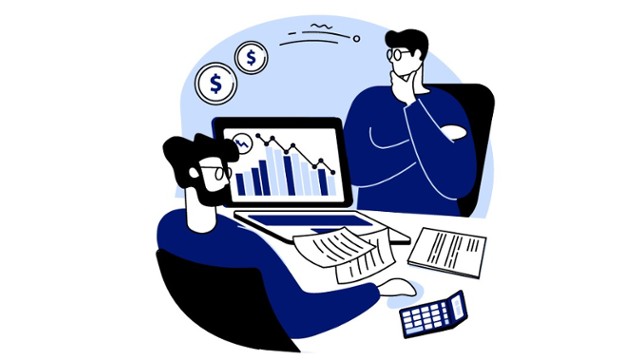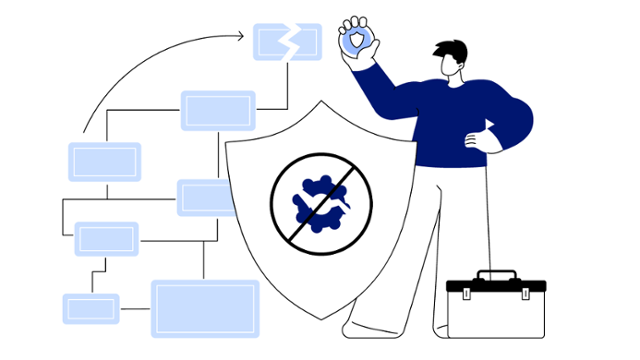
Business owners are the driving force behind our economy. Your relentless hard work and dedication not only provide essential services and products, but also create jobs and foster innovation. Running a business is challenging, especially when unexpected disruptions occur. How well you bounce back if things go south is something you should plan for.
This article explains the concept of business resilience and what you can do to ensure business disruptions are kept to a financial and time cost minimum if your business is affected.
What is business resilience?
Business resilience is your business's ability to adapt and respond to threats and disruptions like natural disasters, cyber-attacks, or even global pandemics. It's about how quickly your business can get back on its feet, or even better, keep running smoothly amid these challenges.
Why is business resilience important?
Think about business resilience as a safety net. Your business should be prepared for a soft landing when it’s needed. Disruptions can strike without warning, and having a resilient business can mean the difference between a minor setback and closing your doors for good.
Tools for building business resilience
There are three tools we recommend:
- A Risk Management Plan: To identify potential risks, evaluate their likelihood and impact, and outline strategies to manage them.
The Queensland Government has an excellent resource to help with this: Identifying and managing business risk. - A Business Impact Analysis (BIA): This is a tool that helps you identify critical business functions and assess the impact of potential disruptions on them. A quick Google search and you’ll be spoilt for choice with examples and templates you can use.
- A Business Continuity Plan (BCP): This is a roadmap for maintaining business operations during disruptions. You can download our guide to get help with your planning, plus read more in our article Back up & recovery: You won't need it until you need it.
Building business resilience step-by-step
1. Identify potential risks and disruptions
The first step towards resilience is knowing what you're up against. From a business information perspective, a disaster is any event that causes catastrophic loss, either full or partial, of the data required to run your operations. While disasters arise from natural causes, a technology disaster is more likely and can be caused by things like faulty hardware, coding errors, cyber-attacks, sabotage or employee error. Your business is unique, so consider the specific risks relevant to your industry, location, and operational structure.
2. Assess the impact of each risk
Once you've identified potential risks, assess how each could impact your business. This might involve examining financial loss, operational downtime, reputational damage, or regulatory penalties.
3. Develop strategies to manage risks
Having identified and assessed potential risks, the next step is creating strategies to manage them. This might include investing in cyber security, migrating to a cloud infrastructure, regularly backing up your data, diversifying suppliers, cross-training staff, or setting aside financial reserves.
4. Create a Business Continuity Plan
A Business Continuity Plan (BCP) is a roadmap for how your business will continue operating during a disruption. It outlines the steps you'll take, resources you'll use, and roles your team will play to keep your business running. It also acts as your go-to document when disaster strikes and emotions are running high. Our Business Continuity Planning Guide can help you craft your own.
5. Test your plan
Testing your BCP ensures it's effective and identifies any gaps or weaknesses. This can be done through scenario planning, drills, or simulations. It’s also important to test it regularly. Things change and so your BCP should reflect your business today, not how you operated 3 years ago.
6. Review and update your plan
Your BCP isn't a set-and-forget document. Apart from amending it after a test exercise, it should be reviewed and updated regularly or whenever there are significant changes to your business operations, technology, resources or the environment in which you operate.
Resilience is a process, not an end point
Building business resilience isn't a one-time task. It’s a continuous process. It involves regular evaluations, adjustments, and improvements with technology playing a lead role.
Implementing technology for business resilience
You can have the most resilient team ever but you put your business at risk if they don’t have the right technology infrastructure and support. This is how we work with our customers to build and maintain their business resilience:
- Data backup and recovery: A resilient business is one that can quickly recover lost data and get back to work with minimal disruption or cost. Our business resilience solutions ensure your data is quickly retrievable.
- Cyber security: We provide right-sized solutions to protect your business from cyber threats. From firewalls to anti-malware programs and employee training, we've got you covered.
- Cloud solutions: Cloud technology allows your business to operate virtually, making it resilient to physical disruptions. Our cloud services ensure your data is safe, accessible, and backed up regularly. Learn more about our cloud solutions here.
- Managed IT services: Our managed IT services ensure your IT infrastructure is always up-to-date and running smoothly. We take care of your IT, so you can focus on running your business. Check out our Tech for SMB’s or Tech for Corporates web pages for more info.
Conclusion
Building a resilient business might seem daunting or a low priority, but it's an investment that will pay off in the long run. Disruptions will happen, but you’ll weather the storm and come out stronger if you have a plan and the technology to support it.
Our team is here to help. Whether you need assistance developing a Business Continuity Plan, implementing technology solutions, or training your team, we're committed to helping your business become more resilient.


